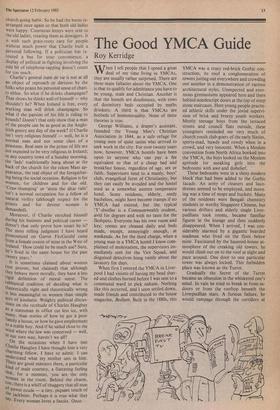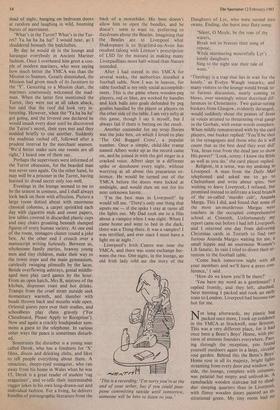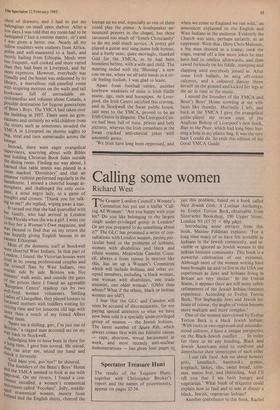The Good YMCA Guide
Roy Kerridge
When I tell people that I spend a great deal of my time living in YMCAs, they are usually rather surprised. There are three main fallacies about the YMCA. One is that to qualify for admittance you have to be young, male and Christian. Another is that the hostels are dosshouses, with rows of dormitory beds occupied by meths drinkers. A third is that YMCAs are hotbeds of homosexuality. None of these theories is true.
George Williams, a draper's assistant, founded the Young Men's Christian Association in 1844, as a safe refuge for young men of quiet tastes who arrived to seek work in the city. For over twenty years now, however, YMCA hostels have been open to anyone who can pay a fee equivalent to that of a cheap bed and breakfast house, regardless of age, sex or faith. Supervisors tend to a manly, boys' club, evangelical form of Christianity, but they can easily be avoided and the hostel used as a somewhat austere temperance hotel. Some residents, elderly, seedy bachelors, might have become tramps if no YMCA had existed, but the typical 'Y'-dweller is a Commonwealth student, avid for degrees and with no taste for the fleshpots. Everyone has his own room and key; rooms are cleaned daily and beds made, except, annoyingly enough, at weekends. As for the third charge, when a young man in a YMCA hostel I know com- plained of molestation, the supervisors im- mediately sent for the Vice Squad, and disguised detectives hung vainly about the lavatory for days.
When first I entered the YMCA in Liver- pool I had visions of having my head shav- ed and clothes burned before I was sent to a communal ward to pick oakum. Nothing like this occurred, and I soon settled down, made friends and contributed to the house magazine, Bedlam. Built in the 1880s, this YMCA was a crazy red-brick Gothic con- struction, its roof a conglomeration of towers jutting out everywhere and crowding one another in a demonstration of various architectural styles. Unexpected and enor- mous gymnasiums appeared here and there behind nondescript doors at the top of steep stone staircases. Here young people practis- ed athletic skills under the jovial supervi- sion of brisk and breezy youth workers. Mostly teenage boys from the terraced streets and council flats outside, these youngsters reminded me very much of church youth club-goers of the early Sixties, sports-mad, bawdy and rowdy when in a crowd, and very innocent. When a Moslem convention from North Africa booked into the YMCA, the boys looked on the Moslem aptitude for sneaking girls into the bedrooms with awe and disbelief.
These bedrooms were in a shiny modern block that had been added to the Gothic facade. An army of cleaners and laun- dresses seemed to be employed, and morn- ing was a time of mops and buckets. Many of the residents were Bengali chemistry students or worthy Singapore Chinese, but various drifters and elderly single Liver- pudlians took rooms, became familiar figures in the lounge and then suddenly disappeared. When I arrived, I was con- siderably alarmed by a gigantic bearded madman who lived on the floor below mine. Fascinated by the haunted-house at- mosphere of the creaking old towers, he would climb out on to the roof at night and pace around. One door to one particular tower was always locked. This forbidden place was known as the Turret.
Gradually the Secret of the Turret became an obsession in the whiskered one's mind. In vain he tried to break in from in- doors or from the rooftop beneath the Liverpudlian stars. A furious failure, he would rampage through the corridors at
dead of night, banging on bedroom doors at random and laughing in wild, booming bursts of merriment.
`What's in the Turret? What's in the Tur- ret? Ya ha ha ha ha!' I would hear, as I shuddered beneath the bedclothes.
By day he would sit in the lounge and harangue everybody in Ancient Mariner fashion. Once I overheard him greet a cou- ple of modern mariners, who were saying how much better the YMCA was than the Mission to Seamen. Greatly diminished, the Mission had given much of its furniture to the 'Y'. Gesturing to a Mission chair, the mariners courteously welcomed the mad- man. When the latter first mentioned the Turret, they were not at all taken aback, but said that the roof did look very in- teresting. However, when the `Ya ha ha ha' got going, and the fevered one declared he would smash every door until he discovered the Turret's secret, their eyes met and they nodded briefly to one another. Suddenly the madman rushed off, followed after a prudent interval by the merchant seamen. `We'd better make sure our rooms are all right,' I heard one of them say.
Perhaps the supervisors were informed of the Turret obsession, for the bearded man was never seen again. On the other hand, he may well be a prisoner in the Turret, having learned its dread secret only too well.
Evenings in the lounge seemed to me to be the utmost in cosiness, and I shall always look back on them with affection. Picture a large room dotted about with enormous classical columns, a carpet sprinkled each day with cigarette ends and sweet papers, low tables covered in discarded plastic cups and easy chairs groaning beneath slumped figures of every human variety. At one end of the room, teenagers cluster round a juke box. At the other end I crouch over a manuscript writing furiously. Between us, wholesome family parties, brawny young men and tiny children, make their way to the tower steps and the main gymnasium, carelessly swinging plimsolls by the laces. Beside overflowing ashtrays, genial middle- aged men play card games by the hour. From an open hatch, Mrs B, mistress of the kitchen, dispenses toast and hot drinks. Tramps from the cruel street outside seek momentary warmth, and slumber with heads thrown back and mouths wide open. Oriental guests pore over their studies, and schoolboys play chess gravely (`For Chessboard, Please Apply to Reception'). Now and again a crackly loudspeaker sum- mons a guest to the telephone. In various other ways the peace is sometimes disturb- ed.
Sometimes the disturber is a young man called Derek, who has a fondness for `X' films, discos and drinking clubs, and likes to tell people everything about them. A tenacious, sleepy-eyed youngster, who ran away from his home in Wales when he was 15, Derek is a great reader of student 'rag magazines', and re-tells their interminable rugger jokes in his own long-drawn-out and individual fashion. For a living, he delivers bundles of pornographic literature from the back of a motorbike. His boss doesn't allow him to open the bundles, and he doesn't seem to want to, preferring to daydream about the Beatles. Imagining that the Beatles are to Liverpool what Shakespeare is to Stratford-on-Avon has resulted (along with Lennon's prescription of LSD for the masses) in making many Liverpudlians more half-witted than Nature intended.
After I had stayed in this YMCA for several weeks, the authorities installed a football table. Now I was in heaven, for table football is my only social accomplish- ment. This is the game where wooden-peg players, red or blue, are worked by handles and kick balls into goals defended by peg goalies handled by the player or players on the other side of the table. I am very nifty at this game, though I say it myself, but I always fail if there is betting on the result.
Another contender for my stray florins was the juke box, on which I loved to play `The Old Rugged Cross', a popular number. Once a simple, child-like tramp named Albert woke up as the record came on, and he joined in with the girl singer in a cracked voice. Albert slept in a different spike or dosshouse every night, without worrying at all about this precarious ex- istence. He would be turned out of the YMCA before the doors were locked at midnight, and would then set out for his next unknown haven.
'I'm the best man in Liverpool!' he would tell me. 'There's only one thing that upsets me — if the spike I stay at turns all the lights out. My Dad took me to a film about a vampire when I was eight. When I came home and went to bed in the dark, there was a Thing there. it was a vampire! I was terrified, and ever since I must have a light on at night.'
Liverpool's Irish Centre was near the YMCA, and there was some exchange bet- ween the two. One night, in the lounge, an old Irish lady told me the story of the
`This is a recording: 'I'm sorry you're at the end of your tether, but if you could post- pone committing suicide until tomorrow, someone will be here to listen to you.'
Daughters of Lyr, who were turned into swans. Ending, she burst into fluty song: `Silent, 0 Moyle, be the roar of thy waters, Break not ye breezes their song of repose, While murmuring mournfully Lyr's lonely daughters Sing to the night star their tale of woes.'
'Theology is a trap that lies in wait for the lonely,' as Evelyn Waugh remarks, and many visitors to the lounge would break in- to furious discussion, nearly coming to blows, over seemingly minor doctrinal dif- ferences in Christianity. Two guitar-toting buskers from Glasgow, evidently deranged, would suddenly shout the praises of Jesus in voices attuned to threatening rival gangs in the Gorbals, with swear-words complete. When mildly remonstrated with by the card players, one busker replied: 'You'll be shot in the synagogues and those who do it will count that as the best deed they ever did! Yea, Jesus rose from the dead just to show His power!"Look, sonny. I know the Bible as well as you do,' the card player replied.
Religion, in a sense, was my undoing in Liverpool. A man from the Daily Mail telephoned and asked me to go to Cheltenham and write about spies. Not wishing to leave Liverpool, I refused, but promised instead to infiltrate a local branch of the so-called 'murder cult', Ananda Marga. This I did, and found that some of the most un-murderous Margas were teachers in the occupied comprehensive school at Croxteth. Unfortunately my report came out before I had left Liverpool, and I returned one day from delivering Christmas cards in Toxteth to find two furious Ananda Margas waiting for me, a small hippie and an enormous Women's Lib fanatic. In vain I tried to divert their at- tention to the football table.
'Come back tomorrow night with all your members and we'll have a press con- ference,' I said.
'How do we know you'll be there?'
`You have my word as a gentleman!' replied frostily, and they left, abashed. Next morning I packed and took an early train to London. Liverpool had become too hot for me.
Not long afterwards, my plastic bag packed once more, I took up residence in the YMCA at Stockwell, near Brixton. This was a very different place, for it had once been a Benn's Boys' Home, with Pic- tures of eminent founders everywhere. Pass- ing through the reception, you found yourself outdoors again in a large, circular rose garden. Behind this the Benn's Boys Home rose in all its majesty, bright lights streaming from every door and window. In- side, the lounge, complete with columns, was palatial but empty and unlived-in. A ramshackle wooden staircase led to shod- dier sleeping quarters than in Liverpool, with flimsy wooden doors painted an In- stitutional green. My tiny room had no chest of drawers, and I had to put my belongings on small open shelves. After a few days I was told that my room had to be fumigated (`Just a routine matter, sir') and I was given a better one. Nearly all my fellow residents were students from Africa, polite and well-mannered to a fault, and mostly hailing from Ethiopia. Meals were less frequent, well cooked and more varied than they had been in Liverpool, and far more expensive. However, everybody was friendly and the hostel was redeemed by its library, a marvellous oak-panelled room with inspiring mottoes on the walls and tall bookcases full of unreadable en- cyclopaedias and volumes about Canada, a possible destination for bygone generations of Benn's Boys. The YMCA had taken over the building in 1957. There were no gym- nasiums and certainly no wild children from the streets such as sometimes invaded the YMCA in Liverpool on stormy nights to beg, steal and turn somersaults across the lounge.
Instead, there were eager evangelical
supervisors, scurrying about with Bibles and holding Christian Book Sales outside the dining room. Finding my way about, I learned that table tennis was played in a room marked `Dormitory' and that an amateur violinist performed regularly in the launderette. I missed a cheerful lounge at- mosphere, and challenged the only occu- pant, a stout negro lady, to a game of noughts and crosses. 'Thank you for talk- ing to me!' she replied, wiping away a tear.
It turned out that she had quarrelled with
her family, who had arrived in London from Florida when she was a girl. I went out to buy her a Woman's Own magazine, and was pleased to find that on my return she was happily giving English lessons to an earnest Ethiopian. Most of the domestic staff at Stockwell were cheerful West Indians. In that part of ,1-0ndon, I found, the Victorian houses were lived in by young professional couples and the council flats by West Indians, two Worlds side l'y side. Brixton was five Minutes' walk away, and outside the gates of the prison there I found an agreeable `Reception Centre' teashop run by two w, ell-bred women volunteers. Smiling !-dies of Llangollen, they played hostess to harassed mothers with toddlers waiting for visiting time and for innocent old lags with more than a touch of my friend Albert about them. Spare me a shilling, guy, I'm just out of Brixton,' a ragged man accosted me on my way back to Stockwell. Adjudging him to have been in there for a iong time, I gave him several. He stared, then ran after me, seized my hand and shook it fervently. `God bless you, guv'nor!' he shouted. The founders of the Benn's Boys' Home approval. the YMCA seemed to look at me with On my return, I found a con- ference installed, a women's ecumenical movement called `Focolare'. Jolly, middle- aged ecumenical women, mostly from !eland and the English shires, cheered the
lounge up no end, especially as one of them could play the piano. A loudspeaker an- nounced prayers in the chapel, but these savoured too much of 'Youth Christianity' to do my soul much service. A pretty girl played a guitar and sang inane folk hymns, and a burly man, quite movingly, thanked God for the YMCA, as he had been homeless before, with a wife and child. The meeting ended with the 'Blessing', a new one on me, where we all held hands in a cir- cle feeling foolish. I was glad to leave.
Apart from football tables, another lowbrow weakness of mine is Irish fiddle music, jigs, reels and hornpipes. At Liver- pool, the Irish Centre satisfied this craving, and in Stockwell the Swan public house, just next to the YMCA, proved to be an Irish Centre in disguise. The Liverpool Cen- tre had been full of nuns, priests and holy pictures, whereas the Irish comedians at the Swan cracked anti-clerical jokes with unseemly gusto.
`We Irish have long been oppressed, and
when we come to England we run wild,' an announcer explained to the English and West Indians in the audience. Evidently the Church was seen, perhaps unfairly, as an oppressor. With that, Dirty Chris Maloney, a big man dressed as a tramp, took the stage, roared off a few more jokes he may have had to confess afterwards, and then sawed furiously on his fiddle, stamping and clapping until everybody joined in. After some Irish ballads, he sang off-colour calypsos, and a coloured dancer threw herself on the ground and kicked her legs in the air in tune to the music.
I sensed the founders of the YMCA and Benn's Boys' Home scowling at me with faces like thunder. Hurriedly I left, and back at the YMCA I gave the evangelical guitar-player my review copy of the Anglican Bishop of Liverpool's new book, Bias to the Poor, which had long been bur- ning a hole in my plastic bag. It was the very least I could do. So ends this edition of my Good YMCA Guide.








































 Previous page
Previous page